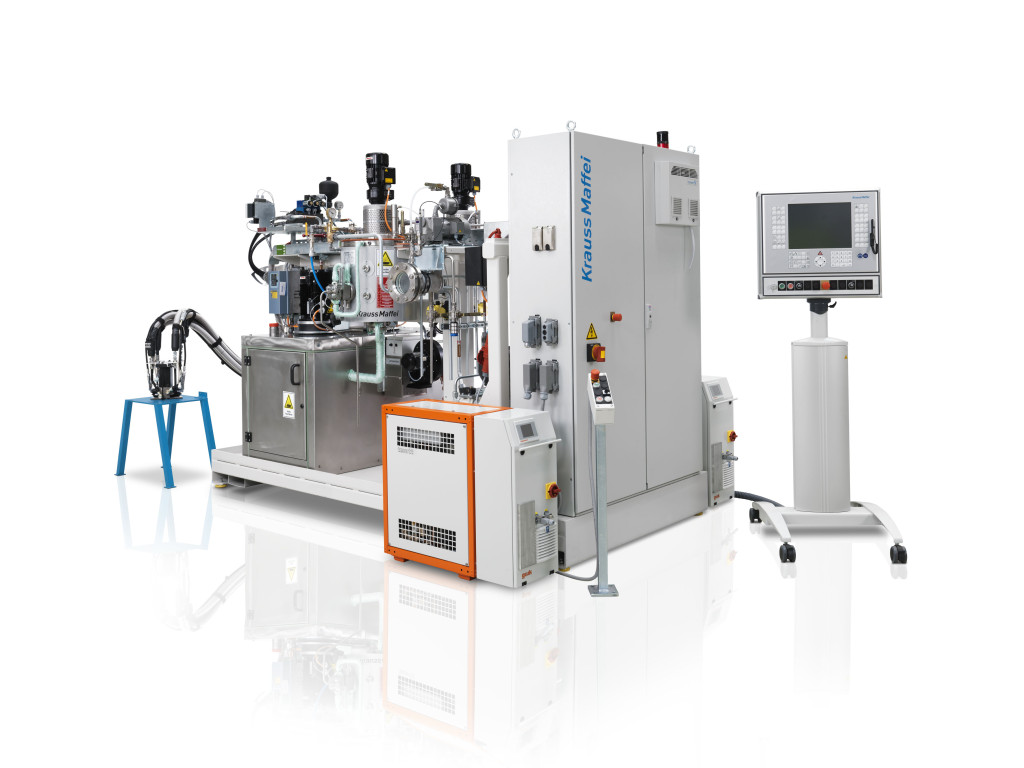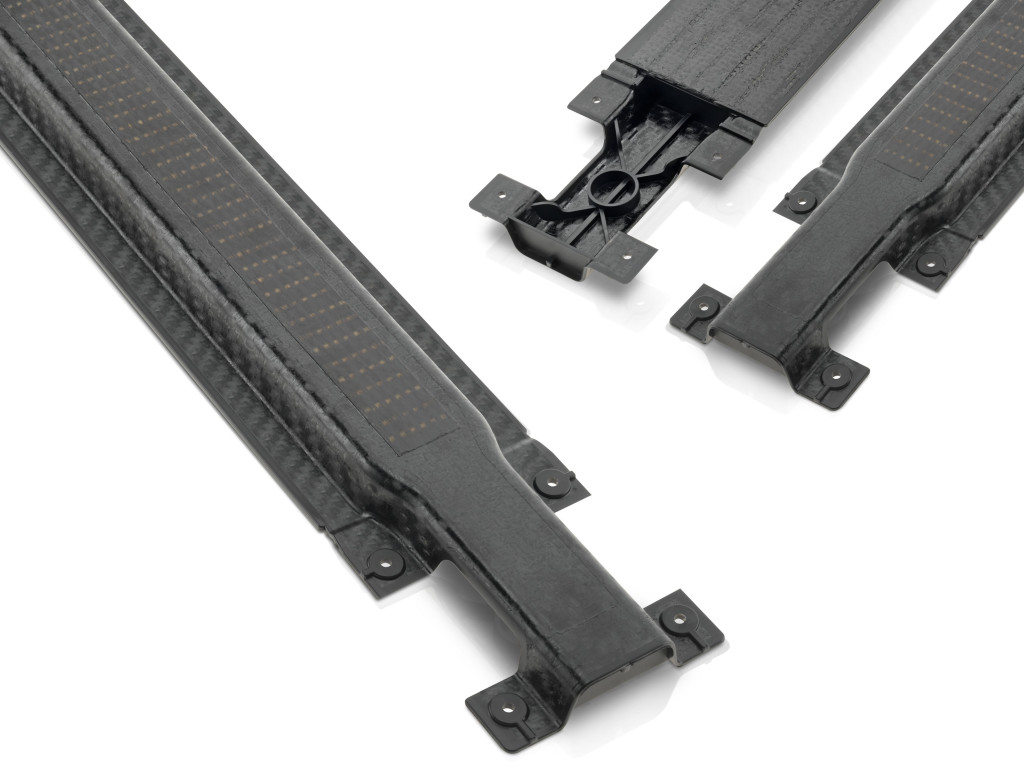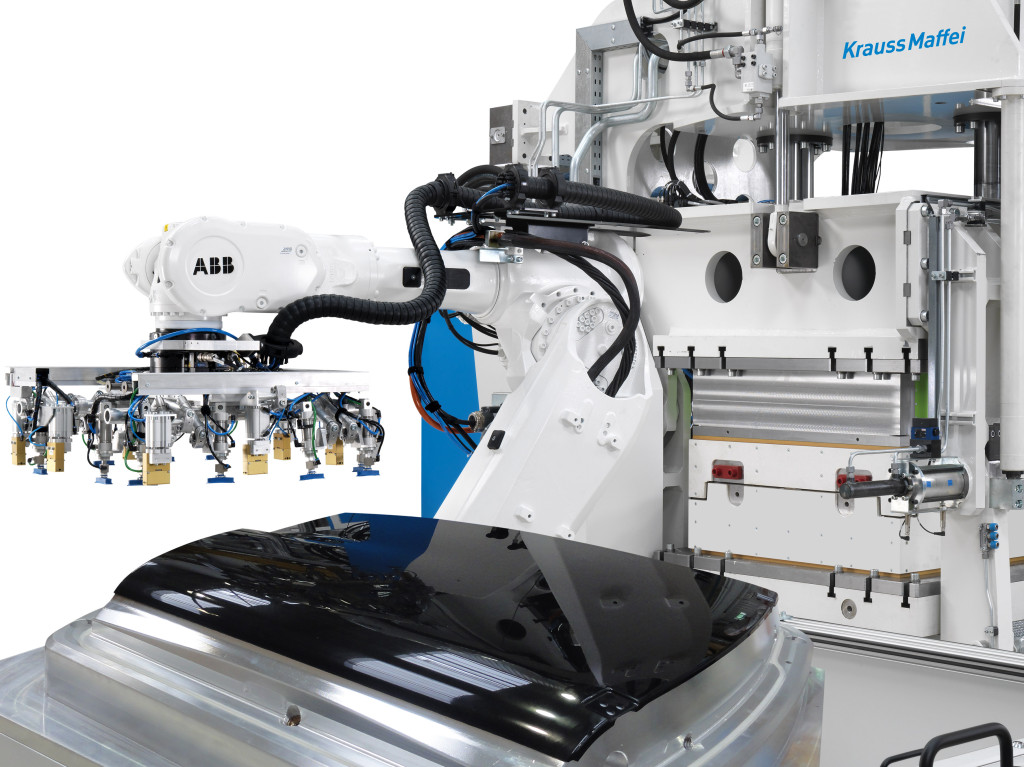The high automatization potential of the RTM process makes it an especially attractive solution for mass manufacturing automotive components made from fiber-reinforced plastic. This technology has primarily been used to process thermoset matrix systems, such as epoxy resin, until now: “The use of thermoplastic matrix systems, which are generally more cost-effective than thermoset ones, has not been possible until now. This is mainly due to their comparably high viscosity when in a molten state, which more or less prevents pore-free impregnation of the dry semi-finished fiber products under acceptable processing parameters,” explains Erich Fries, Head of the Composites/Surfaces Business Unit of the Reaction Process Machinery Division at KraussMaffei. In cooperation with Volkswagen AG and BASF SE, KraussMaffei has now succeeded in transferring the use of thermoplastic matrix systems to the RTM process.
In the so-called T-RTM process, a low-viscous, reactive caprolactam system is injected into a closed, isothermally heat-balanced mold that is lined with endless fiber-reinforced semi-finished textile products, where it is then polymerized into polyamide 6. The polymerization process takes place after the fibers have been saturated, the curing time for which is very short. The first products to have been manufactured using the T-RTM process are B-pillar reinforcement prototypes made at the FRP TechCenter of the Volkswagen Group Research Center in Wolfsburg, Germany.
A basic requirement for successfully developing the T-RTM process was comprehensive adaptation of the caprolactam systems currently in use. In addition to the required activator and catalyst, they also contain a number of additives and admixtures, which are later used to form the matrix systems adapted to FRP components. A special metering machine specifically adapted to processing the extremely low-viscous system was also required to ensure that the manufacturing process runs smoothly. The mixing and metering machine used by KraussMaffei is therefore fitted with a special mixing head, high-performance axial pumps and a fully electric temperature-control System.
The surface RTM process developed by KraussMaffei and its partners enables cost-effective mass production of paintable fiber-reinforced visible components for automotive construction. Paintable components are created by flow-coating the component surface produced by surface resin transfer molding with a polyurethane layer directly in the cavity, without the need for any additional intermediate steps. Costs can be reduced by as much as 60% per component, as there is no need for expensive post-mold finishing, which often needs to be carried out manually. The polyurethane for both the supporting part and its surface is poured in when the mold is slightly open (compression RTM). This produces only a very low flow resistance, which allows injection of the polyurethane system with comparatively high pour rates. Then the mold is closed, which presses the fibers into the resin.
“The demand for this technology has been very high since it was first presented at K 2013. We held a number of intense discussions even then, with OEMs and suppliers who wanted to use the process for mass production. Companies in the electric and electronic goods sectors are also showing a great deal of interest in the process,” says Fries.
The development of KraussMaffei FiberForm technology also focused on creating fully automated production lines and reproducible manufacturing processes with short cycle times. FiberForm is a multi-functional processing method that combines injection molding with thermoforming of composite sheets to further improve the strength of fiber-reinforced plastic parts. It can be used to make seat shells and backs, instrument panel supports, convertible-top compartments, side-impact protection components, technical parts for the engine bay and semi-structural components. This opens up infinite potential for functional integration and part design since FiberForm can be combined with almost all special processes.
In the FiberForm process, endless-fiber fabric or textiles impregnated with a thermoplastic matrix are firstly heated, then shaped in the injection mold and finally over molded. “This allows ribs to be added for extra stiffness and other functions to be integrated into the process. Since production fits seamlessly into an injection molding operation, the process is ideal for mass manufacturing lightweight structural components,” explains Stefan Schierl, Development Engineer of Technology Development at KraussMaffei. Like injection molding, the FiberForm process is easy to automate and can be used in fully automated production with compact manufacturing cells.
The controls for an infrared heater to heat the composite sheets have already been fully integrated into the machine’s control system (MC6). As the machine’s control system records important parameters, this enables the process and the quality of the parts made to be monitored with ease. KraussMaffei also offers the option to preheat the materials using a paternoster-design convection oven. “This technology is distinguished by the fact that the temperature is distributed evenly over the entire surface and thickness of the material during processing, which is also gentle and energy-efficient,” says Schierl. These excellent features are of great importance when manufacturing hollow components with localized reinforcements, for example, as they allow a much greater freedom of design.
KraussMaffei at Composites Europe
Hall 8B, booth G14
The KraussMaffei product brand is internationally recognized for its groundbreaking, multitechnology system and process solutions for injection and reaction molding technology and factory automation. With its standalone, modular or standardized machinery and systems, and a wide, customizable service offering, KraussMaffei is a full-system partner for customers in many industry sectors. KraussMaffei bundles many decades of engineering expertise in plastics machinery and is headquartered in Munich, Germany. For more information: www.kraussmaffei.com
The KraussMaffei Group is among the world’s leading suppliers of machinery and systems for producing and processing plastics and rubber. Its products and services cover the whole spectrum of injection and reaction molding and extrusion technology, giving the company a unique position in the industry. The KraussMaffei Group is innovation-powered, supplying its products, processes and services as standard or custom solutions which deliver sustained added value along the customer’s value-adding chain. The company markets it’s offering under the KraussMaffei, KraussMaffei Berstorff and Netstal brands to customers in the automotive, packaging, medical, construction, electrical, electronics and home appliance industries. Continuing a long tradition of engineering excellence, the international KraussMaffei Group currently employs around 4,000 people. With a global network of more than 30 subsidiaries and more than 10 production plants, supported by around 570 sales and service partners, the company is close to customers around the world. KraussMaffei has been headquartered in Munich since 1838. For more information: www.kraussmaffeigroup.com




